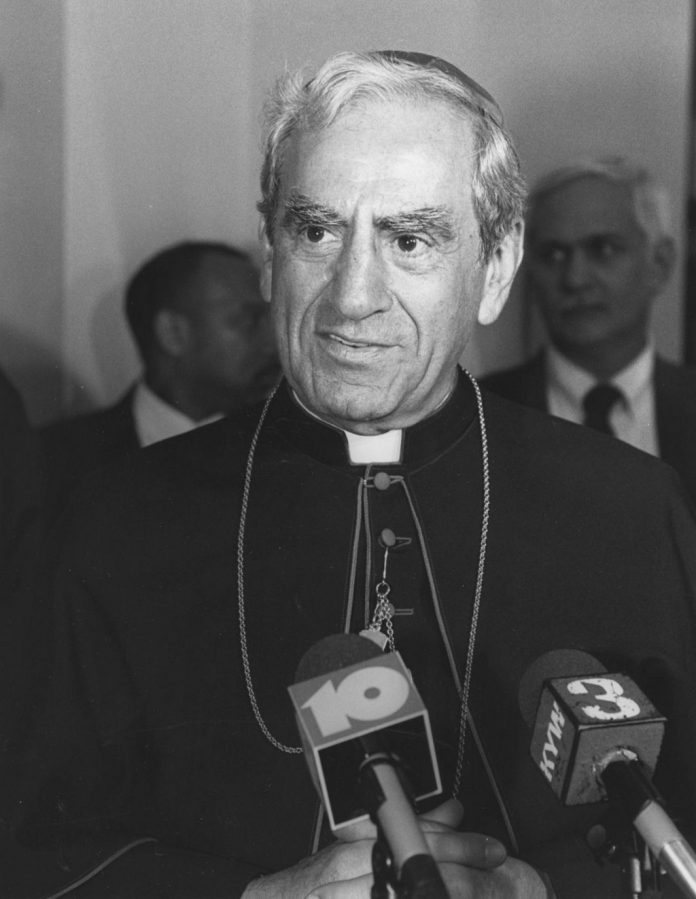Times File Photo
Cardinal Anthony Bevilacqua will have to talk to a judge.
Common Pleas Court Judge M. Teresa Sarmina last Friday set 10 a.m. Monday, Nov. 28, as the time and day she will examine the former leader of the Archdiocese of Philadelphia. She wants to determine if the cardinal is competent to testify in the upcoming trial of one of his former aides.
After meeting with attorneys in her chambers on Friday, the judge said she is leaning toward finding Bevilacqua fit to testify in the trial of Monsignor William Lynn, who is charged with endangering children. Sarmina will allow questioning of the cardinal to be “preserved,” or recorded, and said she had no idea of how long that would take.
“It could potentially be lengthy,” the judge said. It could be days, she suggested. Lynn’s and Bevilacqua’s attorneys as well as prosecutors will be present in the closed session at Bevilacqua’s residence in St. Charles Borromeo Seminary in Wynnewood.
The monsignor, who was the cardinal’s secretary for clergy, is set to go on trial in March along with four co-defendants who are facing child molestation charges. A grand jury early this year said Lynn had endangered children by allowing two priests he had investigated for sexual misconduct with minors to continue to live or work in Philadelphia parishes.
When he was arrested in February, Lynn became the first Roman Catholic administrator in America to be charged with two counts of endangering the welfare of children even though it was not alleged he any contact with minors.
Prosecutors in August said they wanted the 88-year-old Bevilacqua’s testimony, but attorneys for Lynn and the cardinal countered that he is not fit to testify because he is suffering from cancer and dementia.
Also, Lynn’s attorneys, Jeffrey Lindy and Thomas Bergstrom, questioned why prosecutors need Bevilacqua’s testimony when grand jurors whose report precipitated the monsignor’s arrest didn’t require it.
In a phone interview Nov. 15, law professor and attorney Marci Hamilton said she believes prosecutors want the cardinal to testify because “Monsignor Lynn’s issues are directly related to what Bevilacqua knows.”
If the cardinal says he knew nothing about what Lynn was doing in investigating two priests accused of being child molesters and in transferring them to parishes in the archdiocese, Hamilton said, then responsibility would lie directly with Lynn. That would help make the case against him, she said, which explains why Bevilacqua, who headed the archdiocese from 1988 to 2003, is such an important witness for the prosecution.
He is so important that prosecutors used the claims that the cardinal is too ill to testify as an argument for preserving Bevilacqua’s testimony on videotape.
On the flip side, the Catholic Church has been fighting to keep bishops from ever testifying in sex-abuse cases, said Hamilton, who is one of the attorneys who represents several molestation victims who are suing the archdiocese, Bevilacqua, Lynn and several other archdiocesan officials.
“It is relatively difficult to get someone declared incompetent to testify,” Hamilton said.
“We’re grateful that Bevilacqua will have to face tough questions under oath,” said Barbara Dorris, a spokeswoman for the Survivors Network of those Abused by Priests. “He shouldn’t be able to evade responsibility and justice by claiming to be ill … We wish he’d be forced to come to court like everyone else.”
Bevilacqua’s testimony will be among that of between 65 and 75 witnesses, Assistant District Attorney Patrick Blessington expects to call in the four-month trial that is scheduled to begin in Sarmina’s court in late March.
Prosecutors maintain that Lynn had allowed his co-defendants, priests James Brennan and Edward Avery, to continue to live in city parishes where they could have access to children even though he had investigated allegations of their sexual misconduct with minors.
Brennan, Avery, Lynn, the Rev. Charles Engelhardt and former lay teacher Bernard Shero all were arrested in February after a Philadelphia grand jury released its report on sexual abuse of minors by the city’s Roman Catholic clergy. This was the second Philadelphia grand jury that has looked into allegations of abuse by clergy.
The District Attorney’s Office began investigating Avery and Engelhardt in 2009 after the archdiocese itself notified authorities about complaints against the two men. Avery since has been defrocked.
Engelhardt, an Oblate of St. Francis DeSales, was accused of molesting a 10-year-old boy in the sacristy of St. Jerome’s Roman Catholic Church in Winchester Park in 1998 and ’99. The grand jury said Engelhardt then told Avery about the boy, and that Avery then began molesting the child. Shero, a lay teacher at St. Jerome’s parish school, began molesting the boy the next year, grand jurors wrote. The victim is now an adult.
The grand jury said Lynn knew of previous allegations involving a minor and had ordered Avery to get therapy. Grand jurors said Lynn ignored recommendations to keep Avery away from children and had him assigned to St. Jerome’s parish.
During the course of the probe, investigators began looking into allegations Brennan had molested a Chester County boy in 1996. Grand jurors said Lynn knew of previous allegations against Brennan but had transferred him anyway. Brennan was assigned to St. Jerome’s in 1997.
“The rapist priests we accuse were well-known to the Secretary of Clergy [Lynn], but he cloaked their conduct to put them in place to do it again,” grand jurors wrote.
In August, Sarmina said jury selection would begin Feb. 21, and set the trial to begin March 26. ••
Reporter John Loftus can be reached at 215–354–3110 or [email protected]





